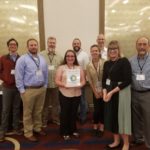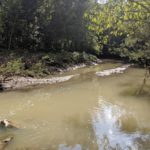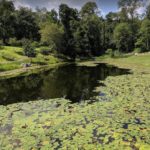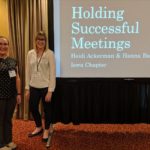Written by Hanna Bates, Program Coordinator for the Iowa Water Center
Regardless of who you are and what path you are on; we all make an impact on water. This belief was the overarching theme of the 74th Soil and Water Conservation Society International Annual Conference held July 28-31 in Pittsburgh, Pennsylvania.
This city, at the confluence of three rivers and contains 446 bridges, is a town of connections that bridges one side of a river to another. This set the scene for the conference in which diverse ideas were brought together to represent our anthropogenic impact on water resources. Conference attendees included those from private industry, public institutions, and government agencies. The three days of presentations, symposia, and tours enabled attendees to debate ideas and address critical questions about the future of our soil and water resources.
Iowa water resource professionals were well represented on the agenda and covered a vast array of topics. These topics included outreach, education, and community engagement; conservation models, tools, and technologies; professional development; engaging the private sector; water resource assessment and management; and social sciences informing conservation.
On the third day of the conference, I attended a tour on how the City of Pittsburgh alongside several other organizations are restoring impacted landscapes within the city and in nearby rural areas. For several decades, the coal and natural gas extraction industries and steel mills had a negative impact on the surrounding landscape due to the establishment of mine drainage areas and dump areas for slag, a waste product from steel production. Tour stops showcased areas that are in the process of being restored.
One stop of the tour was the Pittsburgh Botanic Garden, which is an outdoor garden that spans approximately 450 acres of land. Opened in 2015, this is a long-term program to reintroduce native plant species. During a one-year span in 2015, the garden staff planted 9,000 flowering bulbs and 1,500 saplings. Each year, thousands more are planted. The goal is not only to restore the landscape, but also to provide a place for outdoor education and enjoyment of nature. On the day we visited, approximately 40 acres of the 450 acres were rehabilitated and open for the public to visit.
Another stop on the tour was at Pittsburg’s Frick Park and the 9-Mile Run Watershed. This 6.5-square mile watershed flows through the park and carries on to a slag dump site that was in operation from 1922-1972. Restoration projects in collaboration with the City of Pittsburgh and the 9-Mile Run Watershed Association have improved the site to make it the beautiful walking trail and recreational area that it is today. The area is located near vulnerable communities in Pittsburgh, and so it was restored with the belief that everyone deserves access to nature because of the positive impacts it can have on health and well being.
The Soil and Water Conservation Society along with the Pennsylvania Chapter of SWCS did an excellent job fostering conversations among meeting attendees as well as highlighting the natural resource challenges and solutions in the Pittsburgh area. Next year the 2020 SWCS Conference will be celebrating its 75th year in Des Moines, Iowa.
Save the date for July 26-29, 2020 so that you can be a part of the celebration!



